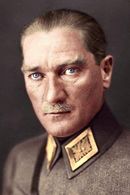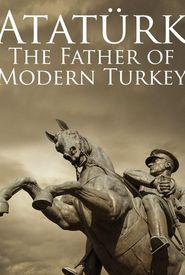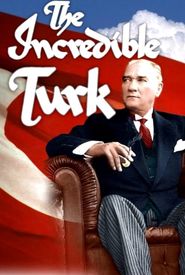Mustafa Kemal was born in 1881 in Salonica, Ottoman Turkey, which is now part of Greece. His father, Ali Riza, a customs official-turned-lumber merchant, died when Mustafa was still a young boy. His mother, Zubeyde, a strong-willed and devout woman, raised him and his younger sister by herself.
Initially, Mustafa was enrolled in a traditional Islamic religious school, but he soon switched to a modern school. In 1893, he entered a military high school, where his mathematics teacher gave him the second name Kemal, meaning perfection in Turkish, in recognition of his superior achievement.
In 1905, Mustafa Kemal graduated from the War Academy in Istanbul with the rank of Staff Captain. He was posted in Damascus, Syria, where he started a clandestine society called "Homeland and Freedom" to fight against the Sultan's despotism.
In 1908, he helped a group of officers who toppled the Sultan. Mustafa Kemal's career flourished as he won heroism in the far corners of the Ottoman Empire during the Italo-Turkish War of 1911-12 and the Balkan Wars of 1913. He also briefly served as a staff officer in Salonica and Istanbul and as a military attaché in Sofia, Bulgaria.
In October 1914, the Ottoman Empire officially entered World War I alongside Germany and Austria as part of the Central Powers. In 1915, Mustafa Kemal, recently promoted to Colonel, became a national hero by winning successive victories against the landing British, French, and ANZAC armies, pinning them down at their beacheads, which finally forced the invaders to evacuate Galipoli in January 1916.
Promoted to General later that year, at age 35, he liberated two major provinces in eastern Turkey against the Russian armies. In the next two years, from 1917 to 1918, he served as commander of several Ottoman armies in Palestine, Aleppo, and elsewhere, achieving another major victory by stopping the British advance at Aleppo just before the war-weary Turkish armies agreed to an armistice with the British on October 31, 1918, which ended World War I in the Middle East.
As a result of the Ottoman Empire's defeat, the Turks lost all of their Middle East territories, except for the traditional Turkish area around Asia Minor. On May 19, 1919, Mustafa Kemal Pasha landed in the Black Sea port of Samsun to start the Greco-Turkish War, also known to the Turks as the War of Independence.
In defiance of the Sultan's government, he rallied a liberation army in Anatolia and convened the Congress of Erzurum and Sivas, which established the basis for the new national effort under his leadership. On April 23, 1920, the Grand National Assembly was inaugurated, and Mustafa Kemal Pasha was elected as its President.
Fighting on many fronts, he led his forces to victory against rebels and the invading Greek armies. Following the Turkish triumph at the two major battles at Izunu in Western Turkey, the Grand National Assembly conferred on Mustafa Kemal Pasha the title of Commander-in-Chief with the rank of Marshal.
At the end of August 1922, the Turkish armies won their ultimate victory. Within a few weeks, the Turkish mainland was completely liberated, an armistice with Greece was signed, and the rule of the Ottoman dynasty was abolished.
In July 1923, the national government signed the Lausanne Treaty with Great Britain, France, Greece, Italy, and other countries, which recognized the new country of Turkey. In mid-October, Ankara became the capital of the new Turkish State. On October 29, the Republic was proclaimed, and Mustafa Kemal Pasha was unanimously elected President of the Republic.
Kemal married Latife Usakligil in early 1923, but the marriage ended in divorce in 1925. The account of Kemal Atatürk's fifteen-year presidency (1923-1938) is a saga of dramatic modernization. With indefatigable determination, he created a new political and legal system based on a Swiss Civil Code, abolished the Islamic Caliphate, and made both government and education secular.
He gave equal rights to women, changed the Turkish language by transferring the written language from the Arabic script to the Roman alphabet, and the attire from Islamic to Western. He advanced the arts and the sciences, agriculture, and industry.
In 1934, when the surname law was adopted, the national parliament gave him the name "Atatürk," meaning Father of the Turks. A heavy drinker most of his life, Atatürk developed liver and kidney problems during the last year of his life. He died on November 10, 1938, at the age of 57. The "national liberator" and the "Father of modern Turkey" was dead, but his legacy to his people and to the world endures to this very day.























